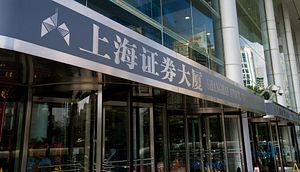All eyes are on Greece this week, where $350 billion in debt threaten a “Grexit” from the euro zone. But another economic nosedive with arguably even greater consequences is taking place: China’s stock market has lost over $3.2 trillion in value in the past month. The Shanghai Composite rose 130 percent between last September and June 12, when it entered a downward spiral that has wiped off more than thirty percent of market value to date, an amount roughly twice the size of the entire Indian stock market.
Signs of a Chinese stock market bubble can be traced over the course of the last year. More Chinese citizens have gotten involved in buying and trading shares on the Shanghai and Shenzhen markets, with college students to grandparents alike making money in a “stir-frying” of stocks. Many of these newer investors were borrowing money to buy shares they couldn’t afford. These smaller, less resilient players on the market believed that stocks could only move higher. The bull market came at a time when the Chinese economy was more broadly slowing, a trend that led to an overvaluation of the market and further exacerbated the market’s detachment from the Chinese economy, according to Patrick Chovanec at Silvercrest Asset Management.
Already, Chinese leadership has taken unprecedented steps toward preventing stocks from falling further. Authorities have suspended initial public offerings (IPOs), restricted bearish bets via stock-index futures, and encouraged financial firms to buy more shares. State-owned enterprises (SOEs) have been ordered by the Assets Supervision and Administration Commission to not sell shares of their listed companies and encouraged to purchase more shares in an attempt to stabilize tumbling prices. In perhaps the most dramatic step of all, nearly 1,500 Chinese companies – more than half of those listed on the exchanges in Shanghai and Shenzhen – have filed to halt trading in their shares in hopes of preventing further losses.
But will these new measures prove effective in correcting the heavy blow dealt to the Chinese markets? Chinese authorities have previously implemented a series of light economic reforms – cutting interest rates, using government pension funds to support the market, and investigating speculative practices – in the hope of letting the markets decide their own future. Yet the bureaucratic arms responsible for shepherding much needed reforms have all too often contributed to China’s economic woes. The People’s Bank of China (PBOC) and China Banking Regulatory Commission (CBRC), for instance, have pursued policies that encourage shadow banking and increase debt levels. Thus, in a series of last-resort steps toward stability, the Xi Jinping administration has opted to lead a market intervention.
For Xi, continued economic insecurity presents a tricky domestic challenge. Rising economic insecurity will be attributed to haphazard economic guidance under the Party’s leadership. Legitimacy of the Party will but only come under closer scrutiny, as farmers to billionaires question the leadership’s ability to ensure a prosperous Chinese economic future. Investors that are not confident in the Chinese stock markets will also be more likely to start pushing their money overseas.
In past instances when the Chinese markets have taken a downturn, the leadership has also attempted to shift the attention of the Chinese people to an external problem. In 2012, for instance, when the Chinese economy posted its slowest growth in over a decade, domestic politics quickly recalibrated to focus externally on territorial disputes with Japan. Chinese citizens took to the streets, boycotting Japanese goods, vandalizing Japanese-owned businesses, and focusing more upon Chinese claims to the Diaoyu Islands than their own economic insecurities. Even beyond any Chinese moves to manufacture or resuscitate an external problem, there is a greater concern today about how the nosedive in stock prices will impact the global economy. Already this week, commodity prices have dropped and markets in the region have shown they are susceptible to Chinese trends.
As Deng Xiaoping once famously said, perhaps Xi and his team are “not worried about making mistakes” in the economic realm. Or perhaps, as analysts at Goldman Sachs have suggested, there remains room for optimism and a future Chinese economic rally. Either way, the latest response to the stock markets threatens both the credibility of the Xi administration and future efforts to liberalize the Chinese economy. While the market was very likely overdue for a correction, the question now is how far of a fall remains and what the ramifications of the state-led intervention will be in China and abroad.
Lauren Dickey is a research associate for U.S. foreign policy at the Council on Foreign Relations.

































